- Home
- Sue Grafton
H is for HOMICIDE Page 3
H is for HOMICIDE Read online
Page 3
It was with my head thus tilted that I entered the glass cubicle Gordon Titus was apparently using for his little get-acquainted meetings with the staff. Vera’s office was located right next to his and I could see her at her desk, shooting me a profoundly cross-eyed look. She was wearing a subdued gray business suit with a plain white blouse, her hair tucked back in a bun. Mr. Titus stood up to meet me and we shook hands across the desk. “Miss Millhone.”
“Hi. How are you? Nice to meet you,” I said.
His grip was appropriately macho, firm and hearty, but not crushing, the contact maintained just long enough to show that his purpose was sincere. At first glance, I have to say he was a pleasant surprise. I pictured dry and gray, someone all nicked in and proper. He was younger than I expected, forty-two at most. He was smooth-faced, cleanshaven, his eyes blue, his hair prematurely gray and stylishly cut. Instead of a suit, he wore chinos and a blue Izod shirt. He didn’t seem all that taken with me. I could tell from his glance that my professional attire was a bit of a shock. He covered it well, perhaps imagining that I’d come in to assist the charwoman with the floors before work.
“Have a seat,” he said. No smile, no small talk, no social niceties.
I sat.
He sat. “We’ve been taking a look at the reports you submitted over the past six months. Nice work,” he said. I could already sense the “but” hanging in the air above our heads. His eye traveled down the page in front of him. He leafed rapidly through the sheaf of notes clipped to the front of a manila file folder. The implication was that he had data on me going back to the first time I threw up in elementary school. There was a yellow legal pad in front of him on which he’d scribbled additional notes in ink. His handwriting was precise, the letters angular, with an emphasis on downward strokes. Occasionally, there were pits where the pen point had torn through the paper. I could picture his thoughts speeding across the page while his cursive stumped along behind, gouging out unsightly holes. He’d never forgotten how to do a formal outline. Topics were laid out with Roman numerals, subclauses neatly indented. His mind probably worked that way, too, with all the categories assigned up front and all the subordinate subjects carefully relegated to the lines below. He closed the folder and set it aside. He turned his attention to me fully.
I thought it was time to jump right in and make quick work of it. “I’m not sure if you’re aware of it, but I’m not actually a California Fidelity employee,” I said. “I work for the company as an independent contractor.”
His smile was thin. “I understand that. However, there are several small issues we’ll need to clarify for corporate purposes. I’m sure you can appreciate the fact that in a review of this sort, we need to see the whole picture.”
“Of course.”
He studied the first and second pages of his legal pad.
I glanced surreptitiously at my watch, under the guise of adjusting the band.
Without looking up, he said, “Have you another appointment?”
“I have a claim to investigate. I should be out in the field.”
He looked up at me. His body was motionless. His blue eyes bored into mine without blinking. He was handsome, but blank, so expressionless that I wondered if he’d had a stroke or an accident that had severed all the muscles in his face.
I tried to keep my mien as dead as his. I’m a bottom-line kind of person myself. I like to cut straight to the chase.
He picked up his pen, checking item one, line one on his list. “I’m not clear whom you report to. Perhaps you can fill me in.”
Oh, Jesus. “It varies,” I said pleasantly. “I’m accountable to Mac Voorhies, but the cases are usually referred by individual claims adjusters.” The minute I started speaking, he began to write. I’m an expert (she said modestly) at reading upside down, but he was using a shorthand code of his own. I stopped speaking. He stopped taking notes. I said nothing.
He looked up at me again. “Excuse me. I missed that. Can you describe the procedure on this? The file doesn’t seem to indicate.”
“Usually, I get a call. Or one of the adjusters might bring a case to my attention. I stop in the office two or three times a week.” He managed to write at exactly the rate I spoke. I stopped. His pen came to a halt.
“In addition to meetings?” he asked.
“Meetings?”
“I’m assuming you attend the regularly scheduled office meetings. Budgets. Sales…”
“I’ve never done that.”
He checked his notes, flipping back a page or two. A frown formed, but I could have sworn his confusion was pure theatrics. “I can’t seem to find your 206’s.”
“Really,” I said. “That surprises me.” I hadn’t the faintest idea what a 206 was, but I thought it should be his responsibility since he brought it up.
He passed a form across the desk to me. “Just to refresh your memory,” he said.
There were lots of slots to be filled in. Dates, times, corporate numbers, odometer readings; clearly a formal report in which I was supposed to detail every burp and hiccup on the job. I passed the form back to him without comment. I wasn’t going to play this game. Screw him.
He’d begun to make notes again, head bent. “I’ll have to ask you to supply the carbons from your files so we can bring our files up to date. Drop them off with Miss Pascoe by noon, if you would. We’ll set up an appointment to go over them later.”
“What for?”
“We’ll need documentation of your hours so we can calculate your rate of pay,” he said as if it were obvious.
“I can tell you that. Thirty bucks an hour plus expenses.”
He managed to convey astonishment without even raising a brow. “Less rental monies for the office space, of course,” he said.
“In lieu of rental monies for the office space.”
Dead silence.
Finally, he said, “That can’t be the case.”
“That’s been my arrangement with CF from the first.”
“That’s absolutely out of the question.”
“It’s been this way for the past six years and no one’s complained of it yet.”
He lifted his pen from the page. “Well. We’ll have to see if we can straighten this out.”
“Straighten what out? That’s the agreement. It suits me. It suits them.”
“Miss Millhone, do you have a problem?”
“No, not at all. What makes you ask?”
“I’m not sure I understand your attitude,” he said.
“My attitude is simple. I don’t see why I have to put up with this bureaucratic bullshit. I don’t work for you. I’m an independent contractor. You don’t like what I do, hire somebody else.”
“I see.” He replaced the cap on the pen. He began to gather his papers, his movements crisp, his manner abrupt. “Perhaps we can meet some other time. When you’re calmer.”
I said, “Great. You too. I have a job to do, anyway.”
He left the cubicle before I did and headed straight for Mac’s office. All the CF employees within range were hard at work, their expressions studiously attentive to the job at hand.
I put the entire exchange in a mental box and filed it away. There’d be hell to pay, but at the moment I didn’t care.
The address I’d been given for Bibianna Diaz turned out to be a vacant lot. I sat in my car and stared blankly at the parcel of raw dirt, crudely landscaped with weeds, palms, boulders, and broken bottles twinkling in the sunlight. A condom dangled limply from a fallen palm frond, looking like a skin shed by some anemic snake. I double-checked the information listed in the file and then scanned the house numbers on either side. No match. I flipped open the glove compartment and pulled out a city map, which I spread across the steering wheel, squinting at the street names indexed alphabetically on the back. There was no other road, drive, avenue, or lane listed with the same name or one that even came close. I’d dropped the Diaz file off at the CF offices before my meeting with Titus, so al
l I had with me were a few penciled notes. I figured it was time to check back with Mary Bellflower to see what else she might have in the way of a contact. I started the car and headed toward town, feeling strangely gratified. The nonexistent street address added fuel to the notion that Ms. Diaz was telling fibs, a prospect that excited the latent felon in me. In California jargon, I can “resonate” with crooks. Investigating honest people isn’t half the fun.
I spotted a pay phone on the far side of a gas station. I pulled in and had my tank topped off while I called Mary at the CF offices and told her what was going on. “You have any other address for this woman?” I asked.
“Oh, Kinsey, poor thing. I heard about your meeting with Gordon Titus. I can’t believe you gave him such a hard time. He was screaming at Mac so loud I could hear it back here.”
“I couldn’t help myself,” I said. “I really meant to behave and it just popped out.”
“Oh, you poor dear.”
“I don’t think it’s that bad,” I said. “Do you?”
“I don’t know. I saw him go off with the corporate vice president and he seemed pretty upset. He told Darcy to take his calls. The minute he walked out the door, the tension level dropped by half.”
“How can you guys put up with that stuff? He’s a jerk. Has he talked to you yet?”
“No, but Kinsey, I can’t afford to lose this job. I just qualified for benefits. I’m hoping to get pregnant, and Peter’s group plan doesn’t cover maternity.”
“Well, I wouldn’t take any guff,” I said. “Of course, I’ll be fired, but what the hell. I’ll live.”
Mary laughed. “If you can pull this one off, it might help.”
“Let’s hope so. Do you have any other address in the file?”
“I doubt it, but I can look. Hang on a sec.” I listened to Mary breathe in my ear while she leafed through the file. Reluctantly, she said, “No, I don’t see anything. You know, we never got a copy of the police report. Maybe she gave them the correct address.”
“Good thought,” I said. “I can stop by the station as long as I’m out. What about the telephone number? Can we check the crisscross?” I had the latest Polk directory in my office, detailing addresses sequentially by street and house number, a second section listing telephone numbers sequentially. Often, if you have one good piece of information, you get a line on a subject by cross-referencing.
She said, “Won’t help. It’s unlisted.”
“Oh, good. A crook with an unlisted number. I love that. How about the license plate on the car? DMV might have something.”
“Well, that I can help you with.” Mary scouted out the plate number of Bibianna’s Mazda and recited it to me. “And Kinsey, if you get the address, let me know right away. I have some forms I want to send her and Mac’s having a fit. You can’t send registered mail to a post office box.”
“Right,” I said. “By the way, how come Parnell didn’t handle this one himself?”
“Beats me. I assumed he was just too busy with his other cases.”
“Maybe so,” I said with a shrug. “Anyway, I’ll call as soon as I know anything. I’m planning to pop by the office later with an update for the files.”
“Good luck.”
I scribbled a few hasty notes to myself after we hung up. I fished out another couple of dimes and tried Bibianna’s work number, a dry cleaning establishment on Vaquero.
The man who answered the telephone was terse and impatient, probably his chronic state. The excess stomach acid was audible in his voice and I pictured him tossing Turns in his mouth like after-dinner mints. When I asked for Bibianna Diaz, he said she was out. Period.
When there was no other information forthcoming, I gave him a prompt. “Do you expect her back soon?”
“I don’t expect nothin’,” he shot back. “She said she’d be out all week. Back problems, she says. I’m not gonna argue anybody has a bad back. First thing you know I get slapped with a goddamn workmen’s comp claim and I’m out big bucks. Nuts to that. Who’s this?”
“This is her cousin, Ruth. I’m passing through town on my way to Los Angeles and I promised I’d stop and see her. Is there any way you could give me her home address? She gave it to me last week when we chatted on the phone, but I walked off without my address book so I don’t have it with me.”
“Nope. Sorry. No dice. And you wanna know why? Because I don’t know you. You could be anyone. Nothing personal, but how do I know you don’t go around slashin’ young girls with a butcher knife? You see what I mean? I give out an employee’s address and I’m liable for anything happens after that. Burglary, harassment, rape. Uhh-huh. No way. That’s my policy.” He sounded like he was in his sixties, a man besieged with lawsuits.
I started to say something else, but he plunked the phone down in my ear. I made a face at the receiver, a mature and effectual way of handling my irritation, I thought. I paid for the gasoline, got back in the VW, and drove over to the police station, where I paid eleven bucks for a copy of the accident report. The address listed was the same nonexistent street address I’d started with. The clerk working at the desk wasn’t one I knew and I couldn’t get her to run a check on Bibianna for me.
I left my car parked out front and walked the half block to the courthouse, where I tried the superior court clerk’s office, scanning the dockets for some sign of Ms. Diaz. Not there. Too bad. It would have cheered me up enormously to learn she had a felony conviction lurking in her background. By now, without ever having laid eyes on the woman, I was operating on the assumption that she was up to no good. I wanted her address and I couldn’t believe there wasn’t a paper trail somewhere. I pulled up negative results from municipal court records, nothing from voter registration. I checked with the DA’s office, where a pal of mine assured me Bibianna wasn’t passing bad paper or late with any child support payments. Well, shoot. I’d just about exhausted the sources I could think of.
I picked up my car and hit the freeway, heading for the county sheriff’s department. I parked in the small lot out front and pushed through the glass doors into a small reception area, where I signed my name in the logbook. I walked down the hall a short distance to a cubbyhole marked “Records and Warrants.” The civilian clerk on duty didn’t seem like a promising source of confidential information. I judged her to be in her early thirties, roughly my age, with a frizzy pyramid of tightly kinked blond hair and way too much gum for the size of her teeth. She caught me surveying her dental misfortunes and pulled her lips together selfconsciously. I checked for a name tag, but she wasn’t wearing one.
“Can you run a computer check and see if this woman has ever been arrested in Santa Teresa?” I reached for the pad of scratch paper on the counter and jotted down Bibianna’s name and her date of birth. I took out my wallet, laid the photostat of my P.I. license next to the note.
Her pale eyes came to rest on mine with the first real sign of recognition. “We’re not allowed to divulge that information. The Department of Justice has very strict guidelines.”
“Well, good for them,” I said. “Why don’t I tell you my situation and see if it helps. I’m investigating Bibianna Diaz for possible insurance fraud, and the company I work for, California Fidelity, needs to know if she’s got a record.”
She processed what I’d said and I watched her formulate a reply with care. She was not quick, this one. She operated with the sort of bureaucratic caution guaranteed to infuriate the honest citizen (also people like me). “If she’s been tried and convicted, you can get that information from the court clerk’s office. It’s a matter of public record.”
“I’m aware of that. I’ve already checked their files. What I’m wondering is whether she’s ever been arrested or booked without being formally charged.”
“If she was never charged or convicted, then the fact that she was arrested would be immaterial. It’s a matter of the individual’s right to privacy.”
“I appreciate that. I understand,” I said. “Bu
t suppose she’s been picked up for burglary or theft and the DA’s decided he can’t make a case…”
“Then it’s none of your business. If she was never formally charged with a crime ���”
“I get the drift,” I said. It never pays to deal with the flyweights of the world. They take far too much pleasure in thwarting you at every turn. I was silent for a moment, trying to compose myself. Situations like this bring up an ancient and fundamental desire to bite. I could envision a half-moon of my teeth marks on the flesh on her forearm, which would swell and turn all colors of the rainbow. She’d have to have tetanus and rabies shots. Maybe her owner would elect to put her to sleep. I smiled politely. “Look. Why don’t we simplify life to some extent. All I really need is a current address. Could you check that for me?”
“No.”
“Why not?”
“Because we can’t give out that information.”
“What about the Freedom of Information Act?” I said.
“What about it?”
“Is there anyone else here I could talk to?”
She didn’t like my persistence. She didn’t like my tone. She didn’t like anything else about me, either, and the feeling was mutual. Her and Gordon Titus. God. Some days it doesn’t pay to get out of bed. She left the desk without another word and returned moments later with a female deputy who was pleasant but unyielding. I went through the same tiresome routine again and got nowhere.
“Well, thanks anyway. This has really been fun,” I said.
I sat in my car out in the parking lot, trying to decide what to do next. This is what happens when I tell the truth, I thought righteously. No wonder I’m forced to lie, cheat, and steal. Honesty will get you nowhere, especially with these law-and-order types. I glanced down at the police report sitting on the passenger seat beside me. I waited for my flush of frustration to subside and then I picked it up.

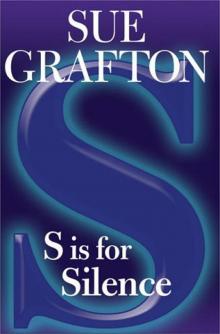 S Is for Silence
S Is for Silence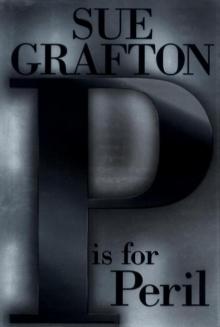 P Is for Peril
P Is for Peril R Is for Ricochet
R Is for Ricochet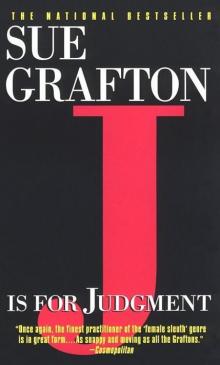 J Is for Judgment
J Is for Judgment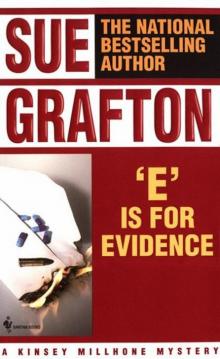 E Is for Evidence
E Is for Evidence T Is for Trespass
T Is for Trespass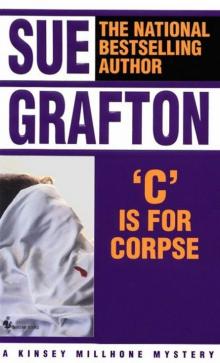 C Is for Corpse
C Is for Corpse U Is for Undertow
U Is for Undertow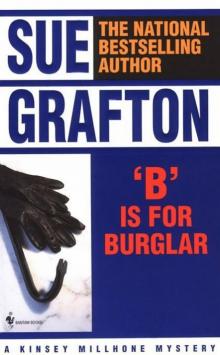 B Is for Burglar
B Is for Burglar Four Sue Grafton Novels
Four Sue Grafton Novels D Is for Deadbeat
D Is for Deadbeat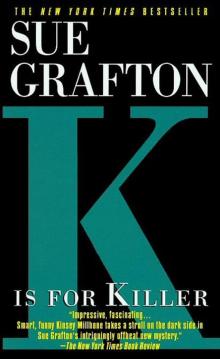 K Is for Killer
K Is for Killer I Is for Innocent
I Is for Innocent A Is for Alibi
A Is for Alibi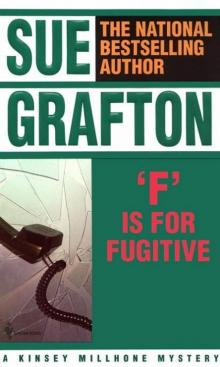 F Is for Fugitive
F Is for Fugitive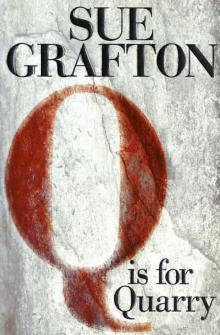 Q Is for Quarry
Q Is for Quarry W Is for Wasted
W Is for Wasted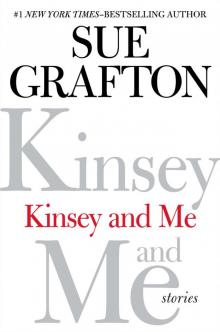 Kinsey and Me: Stories
Kinsey and Me: Stories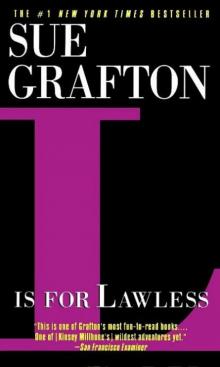 L Is for Lawless
L Is for Lawless Y Is for Yesterday
Y Is for Yesterday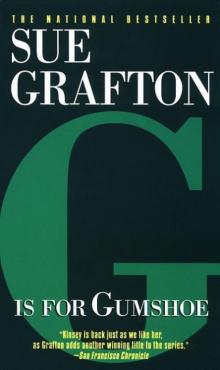 G Is for Gumshoe
G Is for Gumshoe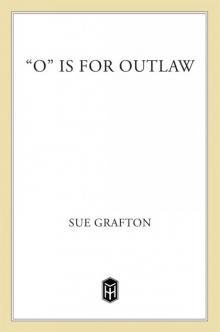 O Is for Outlaw
O Is for Outlaw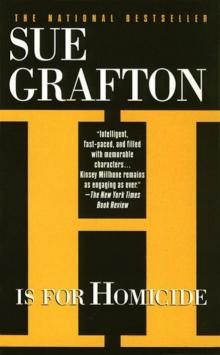 H Is for Homicide
H Is for Homicide X
X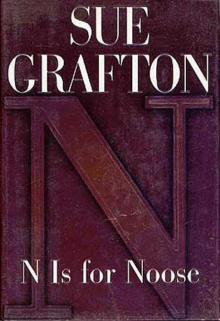 N Is for Noose
N Is for Noose Three Complete Novels: A Is for Alibi / B Is for Burglar / C Is for Corpse
Three Complete Novels: A Is for Alibi / B Is for Burglar / C Is for Corpse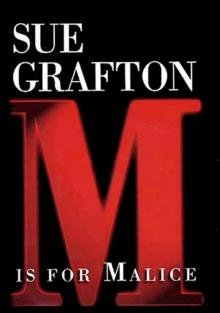 M Is for Malice
M Is for Malice I is for INNOCENT
I is for INNOCENT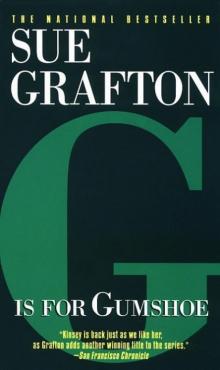 G is for GUMSHOE
G is for GUMSHOE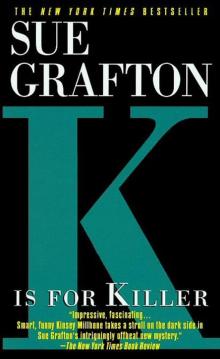 K is for KILLER
K is for KILLER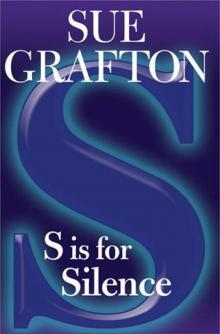 S is for SILENCE
S is for SILENCE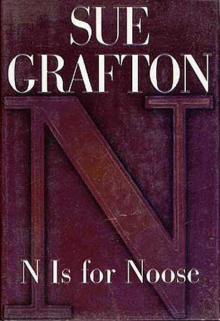 N is for NOOSE
N is for NOOSE D is for DEADBEAT
D is for DEADBEAT V is for Vengeance
V is for Vengeance U is for Undertow
U is for Undertow W Is for Wasted km-23
W Is for Wasted km-23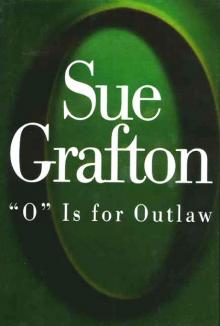 O is for OUTLAW
O is for OUTLAW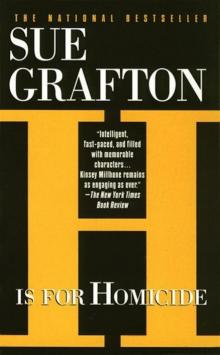 H is for HOMICIDE
H is for HOMICIDE Sue Grafton Novel Collection
Sue Grafton Novel Collection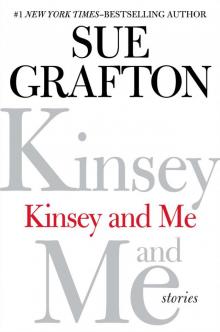 Kinsey and Me
Kinsey and Me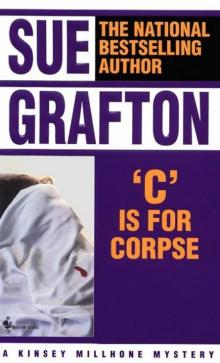 C is for CORPSE
C is for CORPSE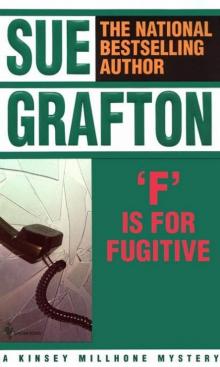 F is for FUGITIVE
F is for FUGITIVE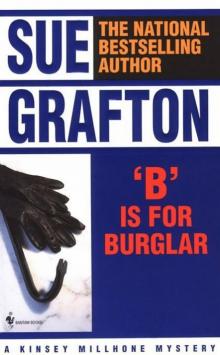 B is for BURGLAR
B is for BURGLAR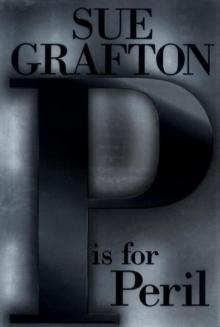 P is for PERIL
P is for PERIL A is for ALIBI
A is for ALIBI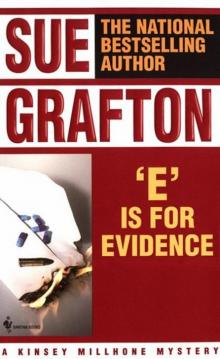 E is for EVIDENCE
E is for EVIDENCE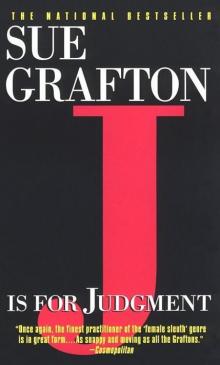 J is for JUDGMENT
J is for JUDGMENT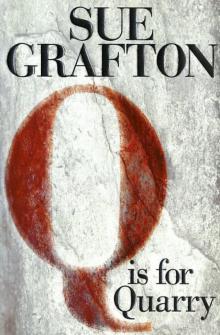 Q is for QUARRY
Q is for QUARRY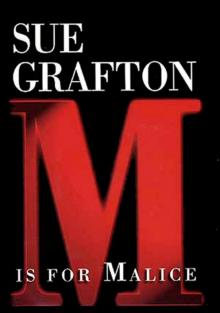 M is for MALICE
M is for MALICE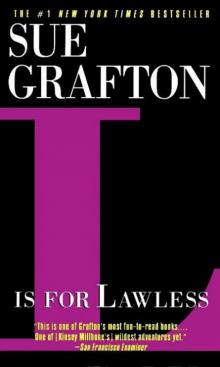 L is for LAWLESS
L is for LAWLESS